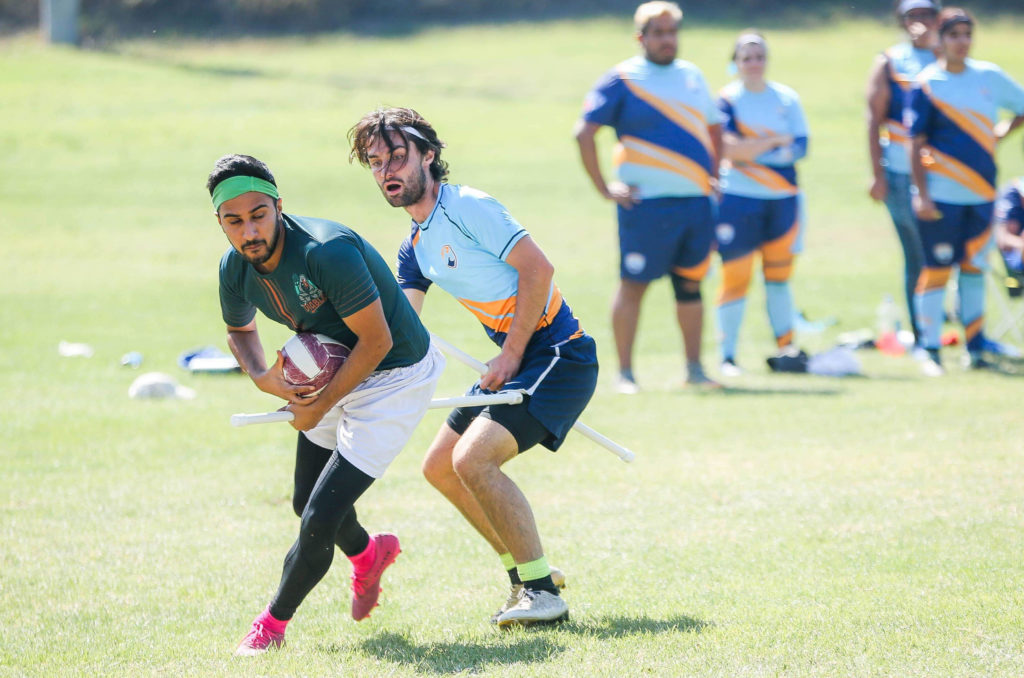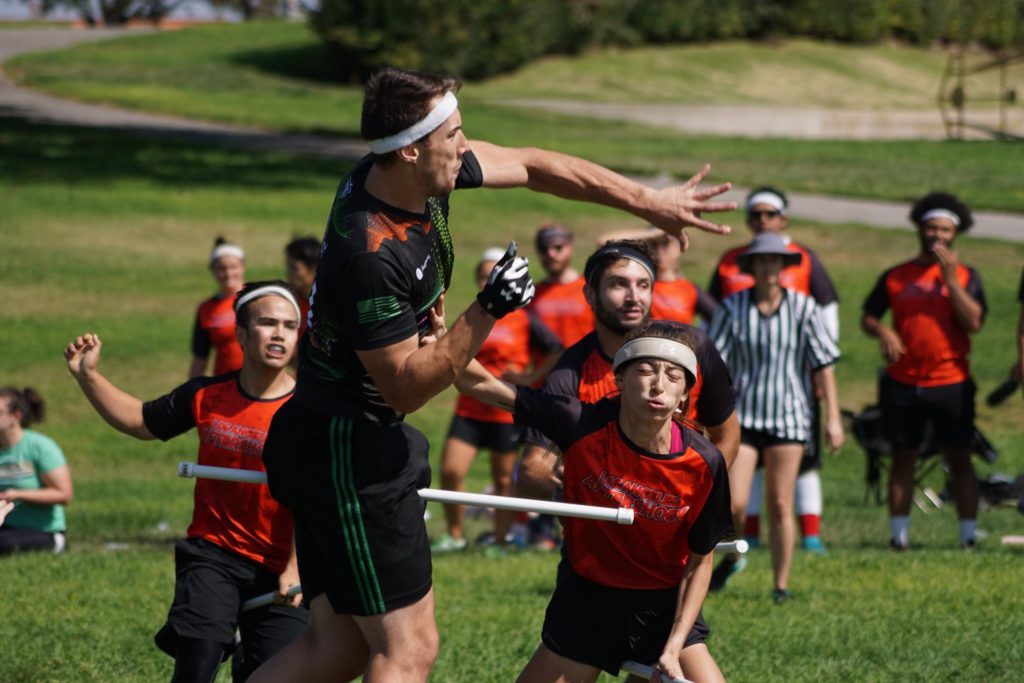Antwerp QC, Much of Belgian Core, Leaves Competitive Quidditch
The rest of USQ may have picked their side on the “competition versus whimsy” scale years ago, but this debate is still very much alive on the West Coast and may be the region’s biggest source of drama and self-sabotage.
Last season, UC Berkeley placed second at USQ Cup 12 and the Los Angeles Gambits earned the second highest historical Elo Standing of any team outside of the Southwest, proving that some players in the West take the sport seriously and achieve results. Meanwhile, other teams accidentally turned the region into the community laughingstock with a game of Duck Duck Goose, and years of poor commitment forced MLQ to remove the West from their league entirely.
The West’s ongoing identity crisis only got more complicated this past summer, and the state of the region has never been more in question.

Credit: Shirley Lu
DIABLOS QC’S LINE IN THE SAND
The end of the 2018-19 season marked the retirement of the Gambits and the graduation of top-tier college players from UCLA and Cal. These changes led to the creation of the Diablos QC. Co-founder Badal Chandra was quick to approach every one of the region’s top players to fill its roster, and secured Cal’s Ryan Pfenning, UCLA and USNT’s Elizabeth Ng and top athletes from the 2017-18 Arizona State University team like Ryan McGonagle and USNT 2018’s Vicky Sanford. These pickups alone made the Diablos a force to be reckoned with, but they didn’t stop there. The Diablos also claimed several former Gambits and various skilled players from less competitive programs. By the end of their recruitment process, the regional newcomers had taken enough players and pickups that several other teams in the area suddenly found themselves with rosters too small to compete this year. The Diablos emerged the region’s clear top team before they even stepped onto a pitch together, and their Neverland Classic victory and resulting ticket to USQ Cup was all but guaranteed.
In theory, if members of the Diablos all played for their local community teams instead, the region as a whole would undoubtedly be stronger. The former Arizona State players could bolster an already impressive Arizona Scorpions; the Rain City Raptors would benefit from Chandra’s coaching experience; the Lost Boys and Long Beach Funky Quaffles certainly could have been enhanced from the numerous SoCal players who opted to join the West’s new all-star team. But the Diablos also gives the region its greatest chance for a championship, and a promise of leadership more dedicated, proven and organized than can be found elsewhere in the West. Each member of the Diablos made it clear where they stand on the “competition versus whimsy” scale upon joining, and challenged the rest of the West to evolve if they hope to stand a chance to compete.
The Lost Boys and Long Beach Funky Quaffles have always seemed to care more about inclusiveness and fun than straight-up winning, but an underwhelming 2018-19 season and the creation of the Diablos forced these top West club teams to re-evaluate their priorities and identities. The Lost Boys found Southwest transplant Azeem Hussain as their new dedicated coach, and managed to pick up several of SoCal’s best players that decided against the Diablos. The team’s newfound drive and dedication propelled them to victories over every Neverland Classic opponent other than the Diablos. And when they faced off against the Diablos in the finals, they held the all-star team in range, a feat they couldn’t have accomplished without their new pickups and focus.
Long Beach, meanwhile, committed further to the whimsy side of the scale and as a result lost several of the team’s staple players: Shea Hillenger, Andrew Burger and Kelly Concepcion to the Diablos and Michael Aguilera and Douglas Tran to the Lost Boys. They lost every game at Neverland Classic and looked like a shadow of the program that once proved capable of defeating elite teams like the Bosnyan Bearsharks and Gambits.

Credit: Savannah Heller
THE IMPLICATIONS OF WESTERN CHAMPIONSHIP QUIDDITCH
In an attempt to fill the void left behind by MLQ and build up morale in a region with dwindling excitement for the sport, a Western Championship Quidditch league was formed. The league’s goal was to once again allow people to represent their home location and participate in an event that would make dedication mandatory and produce guaranteed tight, focused competition. This project might have seemed doomed to fail in a region that couldn’t get organized enough for MLQ, has several USQ teams that don’t regularly practice together and often seems unable to take things as seriously as the rest of the country, but the West fully embraced this new opportunity. Every team bought official jerseys, players attended tryouts and mandatory practices and four full all-star rosters showed up in Torrance, Calif. ready to compete.
Everything about the WCQ Cup exceeded expectations. Participants performed at the highest level they’ve ever played; MLQ’s set score endgame forced athletes to play the best quaffle defense in West history and the competition was exceptionally tight throughout the tournament. Players who typically represent less driven, “whimsical” teams proved that they are fully capable of giving their all and prioritize winning, and that made for potentially the most impressive and exciting all-West tournament in years.
Top-level performances by college players like UC Irvine’s Daniel Belton and Kobe Kendall, UCLA’s Justin Van Ligten and Dana Dixon and SJSU’s Elijah Franklin and Maxine Gutierrez proved that–despite the large number of players who recently graduated from Western programs–the college division in the West still looks promising. College and club participants alike will be able to go back to their USQ teams with new knowledge and experience, as well as hopefully a newfound love for competitive play and increased dedication to the sport. And the success of a project in which participants practiced with and played for a local team might inspire the region to trend toward this novel idea in the future, rather than adopt the Diablos’s super team model of rostering players who live too far apart to train as a unit.
With all that said, only time will tell whether or not the success of WCQ will actually change the overall state of the West or have any lasting impact on the region moving forward.
THE WEST’S FUTURE IS IN THEIR OWN HANDS
Where the West goes from here is entirely up to them. This past weekend proved that teams unsatisfied with their performance last USQ season can commit further to the sport and consequently improve. Players unsatisfied with MLQ’s decision to leave the West can prove the league wrong by demonstrating increased dedication; the commitment shown for WCQ shows that they’re off to a great start in that regard. However, there’s also the sad possibility that the West might continue to play the victim and complain without actually owning up to their own role in recent regional tragedies or doing anything to create positive change, and this could have catastrophic consequences.
The West has had a variety of teams achieve success on a national scale thanks to dedicated leadership and players who were willing to train and work hard, but they’ve also lost various teams because that drive simply wasn’t there. No one wants to see historic programs fade out of existence like USC did once their leaders moved on from the sport, but unless new leaders step forward or current players double down on their dedication level, that’s the trajectory many Western teams are on now.
The Lost Boys’s refocus and recruitment for Neverland Classic and the West’s overall showing at WCQ Cup 2019 showed that one of the U.S.’s most questionable regions can accomplish great things when given the right opportunity and incentive. WCQ’s collegiate players never looked better, and the club league players showed dedication and talent at a higher level than demonstrated for USQ or MLQ in the past. If players can find a way to continue this momentum and keep up enthusiasm for the sport, the West’s future will be bright. The Diablos may be the only team considered nationally relevant right now, but if teams and players stay on the upward, competitive upswing started this weekend–one of the most interesting in West Coast history–we could see a rise from the Lost Boys, UC Irvine, UCLA, the Bay Area Breakers and several others soon enough.
Archives by Month:
- May 2023
- April 2023
- April 2022
- January 2021
- October 2020
- September 2020
- July 2020
- May 2020
- April 2020
- March 2020
- February 2020
- January 2020
- December 2019
- November 2019
- October 2019
- August 2019
- April 2019
- March 2019
- February 2019
- January 2019
- November 2018
- October 2018
- September 2018
- August 2018
- July 2018
- June 2018
- April 2018
- March 2018
- February 2018
- January 2018
- November 2017
- October 2017
- July 2017
- June 2017
- May 2017
- April 2017
- March 2017
- February 2017
- January 2017
- December 2016
- November 2016
- October 2016
- September 2016
- August 2016
- July 2016
- June 2016
- May 2016
- April 2016
- March 2016
- February 2016
- January 2016
- December 2015
- November 2015
- October 2015
- September 2015
- August 2015
- July 2015
- June 2015
- May 2015
- April 2015
- March 2015
- February 2015
- January 2015
- December 2014
- November 2014
- October 2014
- September 2014
- August 2014
- July 2014
- May 2014
- April 2014
- March 2014
- February 2014
- January 2014
- November 2013
- October 2013
- September 2013
- August 2013
- July 2013
- June 2013
- May 2013
- April 2013
- March 2013
- February 2013
- January 2013
- December 2012
- November 2012
- October 2012
Archives by Subject:
- Categories
- Awards
- College/Community Split
- Column
- Community Teams
- Countdown to Columbia
- DIY
- Drills
- Elo Rankings
- Fantasy Fantasy Tournaments
- Game & Tournament Reports
- General
- History Of
- International
- IQA World Cup
- Major League Quidditch
- March Madness
- Matches of the Decade
- Monday Water Cooler
- News
- Positional Strategy
- Press Release
- Profiles
- Quidditch Australia
- Rankings Wrap-Up
- Referees
- Rock Hill Roll Call
- Rules and Policy
- Statistic
- Strategy
- Team Management
- Team USA
- The Pitch
- The Quidditch Lens
- Top 10 College
- Top 10 Community
- Top 20
- Uncategorized
- US Quarantine Cup
- US Quidditch Cup
